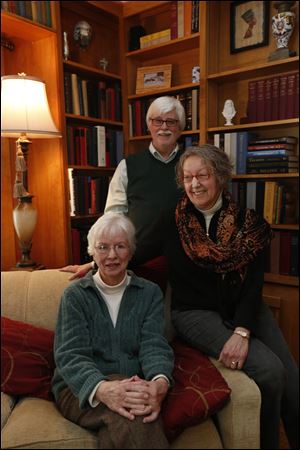
Waterville Historical Society celebrates 50 years
3/10/2014
Phyllis Witzler, left, Jim Conrad, and Toni Stoma are three members of the Waterville Historical Society who are helping ready its anniversary events.
On Feb. 26, 1900, the village of Waterville outlawed certain activities on what was referred to as the first day of the week.
You could be arrested and fined up to $10 if you violated the ordinance to Prevent the Playing of Games and Shooting on Sunday.
The ordinance, among many old documents being organized and preserved at the Waterville Historical Society’s Wakeman Archives, made it unlawful for anyone to engage in any game of ball, marbles, or other game or sport, or to engage in billiards, pool, or bowling at any saloon or other public place. And you could not discharge any firearm except for the purpose of destroying a vicious or destructive animal or bird.
Whether the village had a problem with vicious or destructive animals and birds at the time isn’t mentioned. Nor does the ordinance indicate that bowling or playing marbles was a community concern.
However, as a sign of the times in the 1900s, the ordinance is a keeper, along with many other documents of the past, being preserved now for future generations by the Waterville Historical Society.
Many Waterville residents, including more than 200 who are members of the Waterville Historical Society, are proud of the history of their community, and they are taking special interest in activities related to the riverside town — now a city — as the historical society marks its 50th anniversary.
Events include a 2 p.m. April 27 dedication of a new historical marker that will be erected at Wakeman Hall.
The name Wakeman has long been a part of the community. Henry Hanford Wakeman, born in New York in 1840, was a successful businessman who had an idea to establish a Masonic Lodge in Waterville. That became a reality in 1879, and the lodge was named in his honor. He donated $1,000 to Waterville Township for care of the local cemetery, now known as Wakeman Cemetery.
Because of increasing maintenance costs and declining Masonic membership, Wakeman Hall was put up for sale in 1995, and a drug store’s proposal in 1996 to tear the building down alarmed residents who valued the historical importance of the building.
Galvanized into action, the historical society purchased the building for $80,000. After years of renovation, the upstairs was transitioned into an archival area, and the downstairs became a meeting room for the historical society’s popular public programs. The building’s front portion today resembles an early general store. The hall now is considered a historical destination and an integral part of the city.
In 1964 when the historical society formed with 34 members, its mission was to preserve the rich history of the town.
As membership and interest grew, funds were raised to purchase for $10,000 a historic house on River Road. The 1838 Robbins House Museum opened to the public in 1986. Later, the society bought the 1834 house next door. Known as the Sargent House Museum, it opened in 1992.
As part of the anniversary activities, local historian Jim Conrad will present a “Pictorial History of Waterville” during a program at 7 p.m. March 19 at the Browning Masonic Center, 8883 Browning Dr., Waterville.
He and other members welcome the public to many programs; favorites include programs for third-grade students, some of whom are shocked to learn that a canal at one time flowed through Waterville.
Historical society members bring their own talents to the organization, such as Toni Stoma who landscapes historical society property with lush beauty. Her husband, Jim, is the group’s first vice president. Both are knowledgeable about antiques, and one of her special areas is textiles.
“We have been lucky. New people keep joining and all have their own particular talents,” said Phyllis Witzler, archivist and former president.
Members are sorting and organizing for preservation vintage paperwork from Waterville before it became a city. “These are wonderful old documents,” said Mrs. Witzler, who noted the unusual laws on the books back in the day. You could wind up in mayor’s court if you spit on the sidewalk.
Mr. Conrad, a retired history teacher who is president of the historical society, treasures an old family hymnal, dated 1853, used by his relatives at an area church after his great-great grandfather Michael Conrad came to this area by canal boat, landed, and settled in what is known today as Texas in Henry County.
The Conrad name is familiar in Waterville. Conrad Park is named in honor of his father, Carl Conrad, Waterville fire chief for 40 years.
More than a dozen programs and other activities are scheduled for the 50th anniversary year, and drawing new members is a goal.
Fund-raising efforts continue. The new historical marker cost $2,580. The Waterville Foundation donated $500 toward the 50th anniversary events and $500 toward cost for the marker. Donations to help pay for the marker can be sent to the Waterville Historical Society, P.O. Box 263, Waterville, OH 43566.
Upcoming anniversary events include a program, presented by members Kathy Saco, Mrs. Stoma, Phyllis Hyder, and Rose Kandik, that will feature an 1800s-style tea room at Wakeman Hall on May 10. Look for ladies’ fancy hats of that era to be part of the tea room’s atmosphere.
And, if you happen to have a 1964 convertible, and if you are willing to loan it for a special anniversary event, contact the historical society.
Contact Janet Romaker at: jromaker@theblade or 419-724-6006.